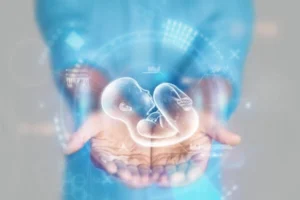Choose Baby’s Gender with Safe, Proven IVF Methods

Many families want to choose the gender of their future child for personal reasons. Some parents hope to create a balance in their family after having several children of the same gender. Others may wish to carry on family traditions or names tied to a specific gender. At the Southern California Fertility Center (SCFC) in La Jolla, we understand these wishes. We offer a caring and advanced approach to help families make informed decisions about their reproductive choices.
In this blog, we will explain how gender selection through in vitro fertilization (IVF) works. We will also discuss its accuracy, safety, and who might benefit from it. Finally, we will share why SCFC is a trusted leader in helping families plan for their future with confidence and care.
Can You Choose Gender in IVF?
 One of the most common questions couples ask is whether you can choose gender during IVF, and the answer is yes, it is indeed possible to determine the sex of embryos through Preimplantation Genetic Testing (PGT), and this process is both safe and highly accurate when conducted by experienced fertility specialists. The Southern California Fertility Center team in La Jolla, headed by Dr. Foyouzi, has extensive clinical experience with various PGT options.
One of the most common questions couples ask is whether you can choose gender during IVF, and the answer is yes, it is indeed possible to determine the sex of embryos through Preimplantation Genetic Testing (PGT), and this process is both safe and highly accurate when conducted by experienced fertility specialists. The Southern California Fertility Center team in La Jolla, headed by Dr. Foyouzi, has extensive clinical experience with various PGT options.
Through PGT, embryos created via in vitro fertilization (IVF) are screened for their chromosomal composition before being transferred. This screening allows doctors to identify the chromosomes in the embryos—either XX (female) or XY (male)—and select the one that best aligns with your family goals.
For further information on the science behind this process, refer to this informative article on Health.com.
How Gender Selection Works at SCFC
 At Southern California Fertility Center, we integrate gender selection into the standard IVF process, ensuring meticulous care at every stage. Here’s how the process works:
At Southern California Fertility Center, we integrate gender selection into the standard IVF process, ensuring meticulous care at every stage. Here’s how the process works:
- Ovarian Stimulation & Egg Retrieval: We use medications to stimulate your ovaries to produce eggs. The retrieval is done gently in an office setting.
- Fertilization: The retrieved eggs are fertilized with sperm in our on-site lab using either IVF or ICSI techniques.
- Embryo Development: We closely monitor the developing embryos until they reach the blastocyst stage (Day 5–6).
- PGT Testing: A few cells from each embryo are biopsied and tested to determine their genetic health and chromosomal sex.
- Embryo Selection: We select the healthiest embryo of the desired gender for transfer. This process is conducted with the highest level of precision and care, ensuring safety and ethical responsibility. To learn more about this service, please visit our Gender Selection & PGT page.
How Successful Is Gender Selection in IVF?
 Thanks to advanced Preimplantation Genetic Testing (PGT) technology, gender identification is over 99% accurate. However, success goes beyond just accuracy; it also involves achieving a healthy pregnancy and a positive experience throughout your journey.
Thanks to advanced Preimplantation Genetic Testing (PGT) technology, gender identification is over 99% accurate. However, success goes beyond just accuracy; it also involves achieving a healthy pregnancy and a positive experience throughout your journey.
At SCFC, we combine cutting-edge technology with unparalleled clinical expertise. Dr. Nastaran Foyouzi, a board-certified OB/GYN and reproductive endocrinologist specializing in genetic medicine, has helped bring thousands of healthy babies into the world. Our laboratory team is highly trained in embryology and genetic testing, ensuring that your embryos receive the highest level of care and assessment.
What Are the Disadvantages of Gender Selection IVF?
Being informed about the potential limitations of medical treatments is crucial. Here are some important factors to consider:
- Cost: In-vitro fertilization (IVF) with preimplantation genetic testing (PGT) is more expensive than natural conception and may not be fully covered by insurance.
- Embryo Availability: Not every IVF cycle results in embryos of both genders, particularly if there are fewer eggs or fertilized embryos.
- Emotional Complexity: Patients may feel disappointed if they do not obtain embryos of their preferred gender.
- Ethical Considerations: While family balancing is largely accepted, gender selection can raise philosophical or cultural questions for some individuals.
At SCFC, we are dedicated to providing transparent and nonjudgmental support to help you navigate these decisions with confidence and compassion.
Who Should Consider Gender Selection?
 If you’re considering gender selection, think about the following reasons:
If you’re considering gender selection, think about the following reasons:
– You want to balance your family after having several children of one gender.
– You or your partner are carriers of a sex-linked genetic condition, such as Duchenne muscular dystrophy or hemophilia.
– You are already undergoing IVF and wish to have the option to choose based on medical or personal reasons.
Whatever your motivation, our team is here to provide understanding, personalized care, and expertise at every step of the process.
Why Choose SCFC for Gender Selection IVF
What distinguishes Southern California Fertility Center is not only our advanced technology but also the exceptional care we provide. Under Dr. Foyouzi’s leadership, our clinic combines scientific expertise with compassionate support, giving patients access to top-tier genetic screening alongside heartfelt assistance.
With an in-house lab and experienced embryologists, our team truly listens to your needs, ensuring your journey is filled with hope, clarity, and comfort. Every aspect of our work is rooted in our mission to help you create the family you’ve always dreamed of with the confidence and peace of mind you deserve.
Let’s Talk About Your Dreams
 Choosing your baby’s gender through IVF is a personal and meaningful decision. At SCFC, we are here to guide you with respect, precision, and warmth throughout the process.
Choosing your baby’s gender through IVF is a personal and meaningful decision. At SCFC, we are here to guide you with respect, precision, and warmth throughout the process.
Whether you are just starting to explore your options or are ready to proceed with treatment, our team is prepared to assist you. Schedule a private consultation today with Dr. Foyouzi to find out if gender selection is the right option for you.
Poor egg quality can be difficult to identify without fertility testing, but some signs may include difficulty conceiving, multiple miscarriages, or failed IVF cycles. Women may also experience irregular or absent periods, as well as poor embryo quality during fertility treatments.
Improving egg quality naturally can be achieved by adopting a healthy lifestyle. Focus on a fertility-boosting diet rich in antioxidants, healthy fats, and lean proteins. Reducing exposure to toxins, quitting smoking, limiting alcohol, and managing stress through acupuncture or meditation can also help improve egg health.
Poor egg quality can be caused by various factors, including aging (especially after 35), hormonal imbalances, genetic abnormalities, lifestyle choices (such as smoking and excessive alcohol), and environmental toxins. Chronic health conditions and certain medications can also affect egg quality.
Foods rich in antioxidants, healthy fats, and essential vitamins can help improve egg quality. Consider adding foods such as leafy greens (like spinach), berries, nuts (like walnuts), fatty fish (such as salmon), and whole grains (like quinoa) to your diet. These foods support hormonal balance and reduce oxidative stress.
Yes, acupuncture can help improve egg quality by promoting blood circulation to the ovaries and balancing hormone levels. It has been shown to support overall fertility by reducing stress and improving ovarian function. Many women incorporate acupuncture alongside other fertility treatments to enhance their chances of conception.
While poor egg quality can make conception more difficult, it is still possible to get pregnant. For women with poor egg quality, assisted reproductive technologies like IVF (with egg retrieval) or egg donation can increase the chances of a successful pregnancy. It’s essential to consult a fertility specialist to explore the best options for your situation.
Supplements like Coenzyme Q10 (CoQ10), Vitamin D, Myo-Inositol, and Folic Acid are commonly recommended to improve egg quality. These supplements help enhance mitochondrial function in eggs, regulate reproductive hormones, and support overall fertility. Consult with your doctor before starting any supplementation.
Late ovulation can sometimes be associated with poor egg quality. Eggs released later in the cycle may not be as viable, and hormonal imbalances can affect ovulation timing. If you’re experiencing late ovulation or irregular cycles, it’s a good idea to consult a fertility expert for evaluation and advice on improving egg quality.



